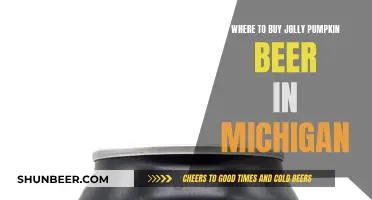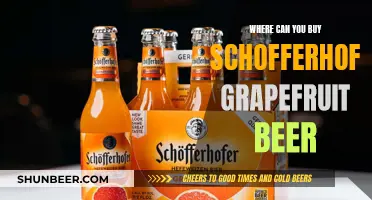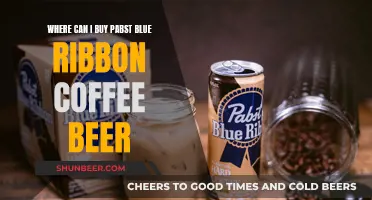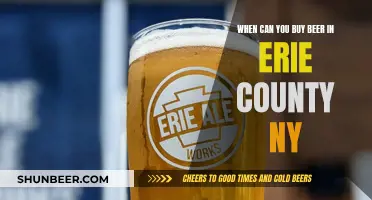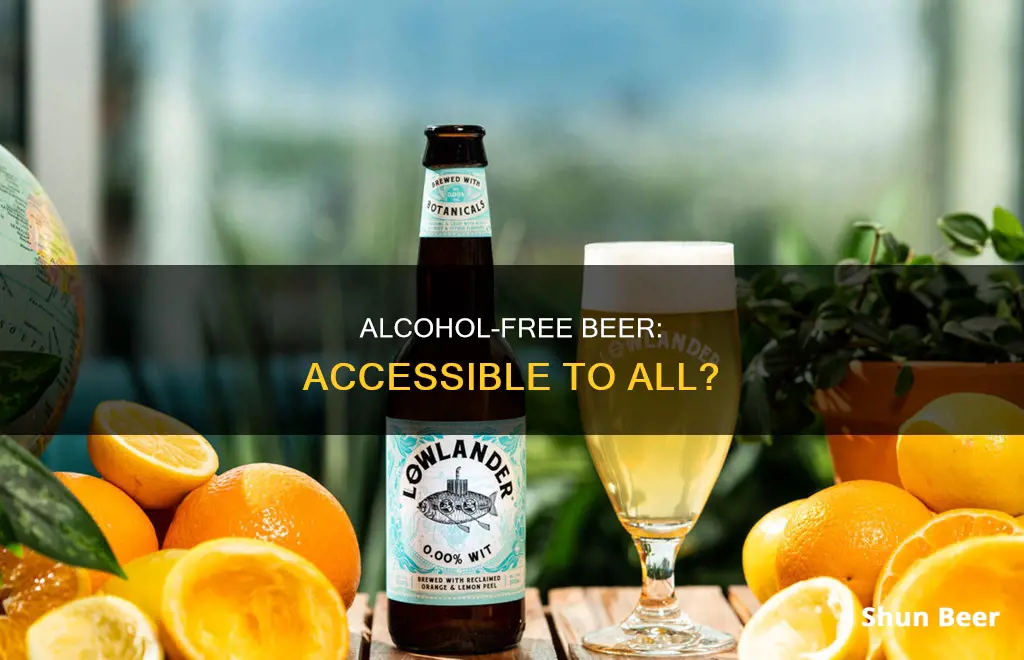
Alcohol-free beer is a drink that contains little to no alcohol by volume, usually defined as less than 0.5% ABV. In many places, alcohol-free beer is treated the same as regular beer, and age restrictions apply. However, in some places, such as certain U.S. states, minors are allowed to purchase and consume non-alcoholic beer. The laws and retailer policies vary, so it's important to know the local regulations before attempting to buy alcohol-free beer.
Can Anyone Buy Alcohol-Free Beer?
| Characteristics | Values |
|---|---|
| Alcohol by Volume (ABV) | 0% or less than 0.5% |
| Legality | In the US, drinks under 0.5% ABV are not considered "alcohol" and are not subject to the same restrictions as alcoholic drinks. However, state laws vary, and some states prohibit the sale of non-alcoholic beers to persons under 21. |
| Age Restriction | In the US, the legal drinking age is 21. In the UK, alcohol-free beer can be sold to anyone, but retailers may still ask for ID to avoid promoting alcohol to minors and to make it easier to enforce rules regarding alcoholic drinks. |
| Availability | Alcohol-free beer is now more widely available in supermarkets and convenience stores, as well as online. |
What You'll Learn
- Alcohol-free beer is treated the same as alcoholic beer in many pubs, bars, and shops
- Alcohol-free beer is often restricted to avoid promoting alcohol to children
- In the US, the Federal Alcohol Administration Act regulates non-alcoholic beer
- In the UK, alcohol-free beer can be purchased by anyone, regardless of age
- Alcohol-free beer is becoming more popular, with large brands pushing their non-alcoholic options

Alcohol-free beer is treated the same as alcoholic beer in many pubs, bars, and shops
In the United States, for example, the Federal Alcohol Administration Act (FAA Act) regulates malt beverages, regardless of their alcohol content, as long as they contain some malted barley, hops, or have been subject to fermentation. Since non-alcoholic beers are produced like conventional beers and then de-alcoholized, they fall under the FAA Act's labeling and advertising jurisdiction. This means that non-alcoholic beers are subject to the same regulations as alcoholic beers when it comes to labeling, advertising, and in some cases, distribution.
Additionally, the production process for non-alcoholic beers may also be subject to certain restrictions. If the production process includes the removal of alcohol through reverse osmosis or other distillation methods, a federal basic permit for a distilled spirits plant may be required. This further contributes to the treatment of non-alcoholic beer as similar to its alcoholic counterpart in terms of regulatory requirements.
In terms of consumer access, the laws vary depending on the state. In some states, such as Ohio, individuals under the age of 21 are permitted to purchase non-alcoholic beer. However, in other states, such as Oregon, West Virginia, and Wyoming, the purchase of non-alcoholic beer by minors is prohibited. This discrepancy in state laws leads to varying treatment of non-alcoholic beer across the country.
In the United Kingdom, the laws are more consistent. Any drink with an alcohol content of 0.5% or lower is considered non-alcoholic and can be purchased by anyone, including minors. This means that non-alcoholic beer, shandy, and even some chocolates with a small amount of alcohol can be bought by individuals of any age.
While the treatment of alcohol-free beer varies globally, it is clear that in many cases, it is subject to similar regulations and distribution channels as alcoholic beer. This is due to the production processes and ingredients used, which often align with the legal definitions of "beer" or "malt beverage" in different regions.
Utah Beer Buying Hours: Time Restrictions Explained
You may want to see also

Alcohol-free beer is often restricted to avoid promoting alcohol to children
The main reason for this restriction is to avoid promoting alcohol to minors. While alcohol-free beer may not contain a significant amount of alcohol, the packaging and the drink itself are often indistinguishable from alcoholic beer. Additionally, many alcohol-free beers are produced by companies that also produce alcoholic drinks. As a result, allowing minors to purchase alcohol-free beer could indirectly promote similar alcoholic products to them. Some organisations, such as AB-Inbev and the Portman Group, have policies in place that cover the promotion and sale of non-alcoholic drinks to minors. Retailers such as Tesco, Lidl, Aldi, Asda, and Waitrose have also stated that they restrict the sale of alcohol-free beer to avoid promoting alcohol to underage customers.
Another reason for the restriction is to make it easier for retailers and pubs to enforce rules regarding alcoholic drinks. As the packaging of alcohol-free beer is almost identical to that of alcoholic beer, it can be difficult for staff to distinguish between the two, especially in pubs and bars where owners are responsible for what people drink on the premises. By treating alcohol-free beer the same as alcoholic drinks, retailers and pubs can more effectively monitor their customers' consumption and ensure compliance with alcohol-related laws and regulations.
The restriction on alcohol-free beer for minors is a controversial topic. While some people argue that it is unnecessary and inconvenient, others believe that it is in the best interests of society to voluntarily restrict the sale of these beverages to protect children from the potential dangers of alcohol. In some states in the United States, such as Ohio, Mississippi, and North Dakota, the consumption of non-alcoholic beer by minors is prohibited or restricted to those over the age of 18. However, the laws and regulations vary significantly across different regions and states, so it is important for individuals to be aware of the specific rules in their area.
Best Root Beer Barrel Candy: Where to Buy?
You may want to see also

In the US, the Federal Alcohol Administration Act regulates non-alcoholic beer
In the US, the Federal Alcohol Administration Act (FAA Act) regulates non-alcoholic beer, even though its alcohol content is below the threshold for what is considered an alcoholic beverage. This is due to a legal anomaly that classifies any malt beverage as a "beer" and therefore subject to the FAA Act.
The FAA Act, enacted in 1935, was created to regulate interstate and foreign commerce in distilled spirits, wine, and malt beverages, enforce the 21st Amendment, and protect revenue and enforce postal laws regarding these beverages. It defines "beer" as:
> "a beverage made by the alcoholic fermentation of an infusion or decoction, or combination of both, in potable brewing water, of malted barley with hops, or their parts, or their products, and with or without other malted cereals, and with or without the addition of unmalted or prepared cereals, other carbohydrates or products prepared therefrom, and with or without the addition of carbon dioxide, and with or without other wholesome products suitable for human food consumption."
The Act also gives the Secretary of the Treasury broad authority to regulate the labeling and advertising of malt beverages, including non-alcoholic beer. This includes requiring health warning statements on containers regarding the risks of alcohol consumption during pregnancy and the impairment of driving or operating machinery abilities.
While the FAA Act regulates non-alcoholic beer at the federal level, the laws regarding the purchase and consumption of these beverages by minors vary by state. Some states, like Ohio, allow those under 21 to purchase non-alcoholic beer, while others, like Oregon, West Virginia, and Wyoming, prohibit it. Other states have more complex or undefined laws, making it challenging to determine the legality of non-alcoholic beer consumption for minors.
The varying state laws and retailer policies highlight the importance of understanding the local regulations before attempting to purchase non-alcoholic beer, especially for those under 21.
Snake Venom Beer: Where to Buy This Exotic Brew?
You may want to see also

In the UK, alcohol-free beer can be purchased by anyone, regardless of age
Alcohol-free beer is a drink that typically contains less than 0.5% alcohol by volume (ABV). In the UK, drinks under 0.5% ABV are not legally considered alcoholic and are not subject to the same restrictions as regular beers. This means that in the UK, alcohol-free beer can be purchased by anyone, regardless of age.
While alcohol-free beer does contain trace amounts of alcohol, many everyday foods and drinks, such as ripe bananas and bread, contain similar amounts of alcohol and are not restricted. In fact, fruit juices like orange juice, apple juice, and grape juice can contain an ABV of up to 0.86%, which is higher than that found in alcohol-free beer.
Despite this, the sale of alcohol-free beer to minors is often restricted by pubs, bars, and retailers. This is primarily done to avoid promoting alcoholic drinks to children and to make it easier to enforce rules regarding alcoholic beverages. Many companies that produce alcoholic drinks also produce alcohol-free alternatives, and allowing minors to purchase alcohol-free beer could indirectly promote alcoholic products to them. Additionally, the packaging and appearance of alcohol-free beer are almost indistinguishable from regular beer, making it difficult for staff to monitor whether customers are drinking alcohol or not.
In the United States, the laws regarding the purchase of alcohol-free beer by minors vary from state to state. While some states allow the purchase of alcohol-free beer by those under 21, others do not, and some states have undefined or unclear regulations.
Beer Buying in Illinois: Late-Night Restrictions
You may want to see also

Alcohol-free beer is becoming more popular, with large brands pushing their non-alcoholic options
Alcohol-free beer is becoming increasingly popular, with large brands pushing their non-alcoholic options and craft brewers producing alcohol-free brews that rival their full-strength equivalents. This shift towards non-alcoholic beverages is driven by a growing focus on health and wellness, as well as a changing social landscape. As a result, alcohol-free beer is now much easier to find in supermarkets and convenience stores, and there is a growing market for it.
In the past, non-alcoholic beer options were limited in terms of flavour and style. However, big-box brands and craft breweries are now offering a wider range of options, including lagers, IPAs, and stouts. This trend is expected to continue, with experts predicting double-digit growth in the non-alcoholic beer market in the coming years. Even beer giant AB InBev, which owns Golden Road Brewing, has set a goal for at least 20% of its global beer volume to be no- or low-alcohol by 2025.
While the quality and choice of alcohol-free beers can still vary, there are now many flavorful options available from both large brands and craft breweries. Heineken, for example, launched Heineken 0.0 in 2017, while Budweiser released its no-alcohol Prohibition Brew in 2016. Craft breweries are also getting in on the action, with Connecticut's Athletic Brewing dedicated to producing non-alcoholic beer with a craft-brewery mentality. This means that there is now a non-alcoholic beer to suit almost any beer drinker's taste, whether they prefer a light, refreshing beer or a rich, thick stout.
The laws surrounding the purchase of non-alcoholic beer vary depending on the region. In some places, minors are allowed to buy non-alcoholic beer, while in others, the legal drinking age applies even to these low-alcohol beverages. However, despite the varying regulations, the popularity of alcohol-free beer continues to grow, and it is becoming easier for consumers to find and purchase these products.
Best Places to Buy Half Acre Beer
You may want to see also
Frequently asked questions
It depends on where you are. In the UK, alcohol-free beer can be sold to anyone, but in the US, it depends on the state. For example, in Texas, Wisconsin, New Jersey, Illinois, Alaska, and Hawaii, there are no age restrictions, but in Oregon, West Virginia, and Wyoming, you have to be over 21.
Alcohol-free beer usually contains a small amount of alcohol (up to 0.5% ABV). However, the main reasons for restrictions are to avoid promoting alcohol to children and to make it easier to enforce rules regarding alcoholic drinks.
Alcohol-free beers aim to reproduce the taste of regular beers, but some common complaints about them include a loss of flavour and a sugary taste.
Alcohol-free beers have seen a rise in popularity in recent years, especially in the Middle East, which now makes up a third of the market. In the UK, younger generations are shunning alcoholic drinks in favour of low- or no-alcohol options.


